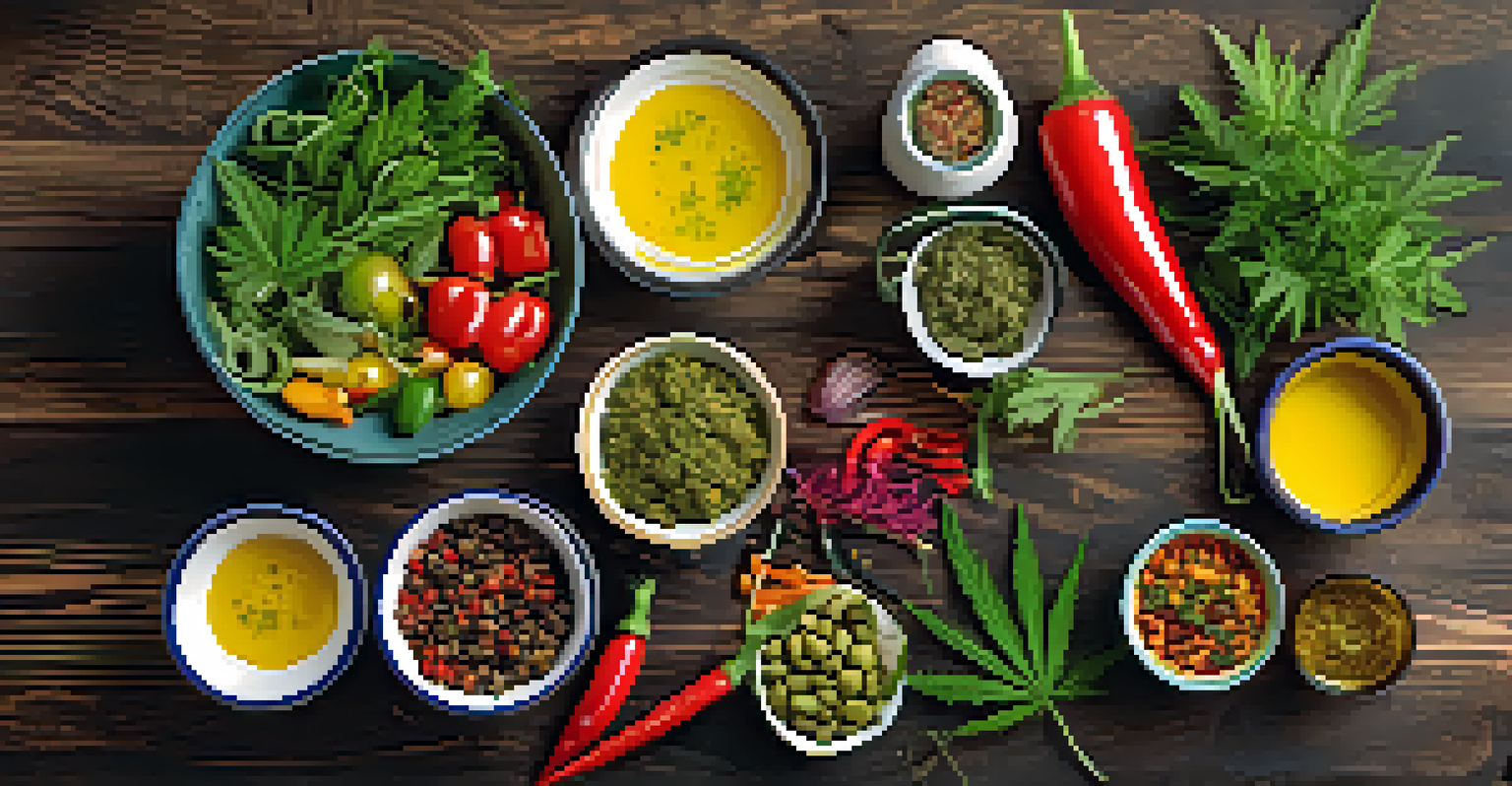Can Marijuana Help or Hinder Healthy Eating Habits?

Understanding Marijuana and Its Effects on Appetite
Marijuana is known to affect appetite, often leading to what's colloquially called 'the munchies.' This phenomenon occurs due to THC, the psychoactive compound in cannabis, which interacts with the brain's receptors that control hunger. As a result, many users find themselves craving snacks or comfort foods, which can significantly impact their eating habits.
Cannabis is a complex plant, and its effects are just as complex. Understanding how it interacts with our bodies can help us make better choices.
While some may enjoy the heightened sense of taste and smell that cannabis can provide, it’s essential to consider what types of foods are often craved. Typically, these cravings lean towards high-calorie, low-nutrient options like chips, cookies, or fast food. This can lead to unintentional overeating and unhealthy choices if mindfulness isn't practiced.
On the flip side, marijuana can also help those with specific medical conditions that affect appetite, such as cancer or HIV/AIDS. For these individuals, the increased desire to eat can be a beneficial side effect, helping them maintain a healthy weight and get the nutrients they need.
The Role of Mindfulness in Eating After Consumption
Mindfulness, or being present during meals, is crucial for healthy eating habits. When under the influence of marijuana, however, this mindfulness may take a backseat to cravings. Without careful attention, individuals may find themselves snacking mindlessly, leading to excess calorie intake and potentially poor food choices.

To combat this, it’s important to establish mindful eating practices, even when enjoying marijuana. For example, focusing on the flavors of the food, eating slowly, and recognizing when you're full can help mitigate the mindless munching often associated with the 'high.'
Marijuana Boosts Appetite
THC in marijuana can trigger cravings for high-calorie snacks, impacting eating habits.
Additionally, preparing healthy snacks in advance can be a game-changer. By having nutritious options readily available, you can satisfy cravings without veering too far off the healthy eating path.
Marijuana's Potential Benefits for Healthy Eating
Despite the potential for unhealthy snacking, marijuana can also foster a more enjoyable eating experience. For some, cannabis can reduce anxiety associated with eating, especially for those with eating disorders or social anxiety. This can lead to a more relaxed and positive relationship with food.
Mindful eating is about being present and aware of the food we consume. It helps us enjoy our meals and make healthier choices.
Moreover, cannabis can stimulate appetite in those who otherwise struggle to eat, encouraging balanced meals. This can be particularly beneficial for individuals undergoing treatments that affect their appetite.
Finally, with the rise of cannabis-infused foods, some are exploring healthier alternatives that incorporate marijuana into balanced meals. This can create a fun and innovative way to enjoy cannabis without compromising nutrition.
Identifying Healthy Snack Options When High
Choosing healthy snacks can be a challenge when under the influence of marijuana, but it’s not impossible. Opting for whole foods, such as fruits, vegetables, nuts, and yogurt, can satisfy cravings without leading to excessive calorie consumption. Preparing these snacks ahead of time can also help you resist the temptation of junk food.
For instance, if you're craving something crunchy, consider air-popped popcorn lightly seasoned with herbs instead of chips. This not only curbs the craving but also adds nutrients without the guilt.
Mindfulness Mitigates Munchies
Practicing mindfulness while eating can help control cravings and promote healthier food choices.
It’s also helpful to keep hydrated. Sometimes, what feels like hunger can actually be dehydration. Keeping water or herbal teas on hand can help manage cravings and keep your body balanced.
The Risk of Overindulgence and Its Consequences
One of the significant risks of marijuana consumption is the tendency to overindulge in food. This can lead to weight gain, increased body fat, and associated health issues, particularly if unhealthy foods are the primary choice. Understanding this risk is crucial for anyone who enjoys marijuana and wants to maintain healthy eating habits.
Additionally, repeated overindulgence can create a cycle of unhealthy eating that’s hard to break. If you consistently choose high-calorie snacks, your body may start to crave these unhealthy options more frequently, leading to a pattern that can be difficult to change.
To avoid this, setting limits on how much you consume, both in terms of marijuana and food, can be beneficial. Being aware of your body's signals and practicing moderation can help maintain a healthy balance.
Balancing Marijuana Use with Nutritional Goals
Achieving a balance between enjoying marijuana and maintaining nutritional goals is essential. This means being intentional about when and how you consume cannabis and what foods you choose afterward. Planning can make a significant difference in steering clear of unhealthy eating habits.
For example, consider setting specific days for marijuana use that align with a healthy meal plan. This way, you can prepare nutritious meals and snacks that complement your cannabis experience, ensuring you stay on track with your health goals.
Seek Professional Guidance
Consulting with nutritionists or mental health professionals can aid in balancing marijuana use with healthy eating.
Moreover, tracking your food intake and marijuana use can provide insights into how they interact. Many find that keeping a journal helps identify patterns and make more informed choices.
Seeking Professional Guidance for Healthier Choices
If you're struggling to find a balance between marijuana use and healthy eating, seeking professional help can be beneficial. A nutritionist or dietitian can provide personalized advice that considers your lifestyle and dietary preferences, helping to create a sustainable eating plan.
Furthermore, mental health professionals can assist in addressing any underlying issues related to eating habits or substance use. Understanding the psychological aspects can be crucial in developing healthier relationships with food and cannabis.

Ultimately, combining professional guidance with personal mindfulness practices can lead to a more balanced approach to eating while using marijuana, ensuring that you enjoy the benefits without compromising your health.